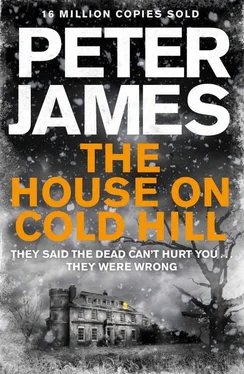When he had finished, Manthorpe nodded silently, and tapped the embers out of his pipe bowl into the growing pile of grey ash in the ashtray. ‘Oh dear,’ he said finally. ‘Oh dear.’ He looked at Ollie with a dubious expression. ‘Cold Hill House was empty during most of my time there. As I said, there were a lot of rumours about the place — you know, village gossip.’
‘What rumours?’
‘About it being cursed, if you believe in that sort of thing. And there was one particular rumour.’ He shrugged dismissively, produced a tobacco pouch from his pocket and began to refill his pipe. ‘The problem is, Mr Harcourt—’
‘Please call me Ollie.’
He nodded. ‘OK, Ollie, the problem is that in country villages people have time on their hands. Too much of it. They gossip, speculate.’
‘What did they speculate about Cold Hill House?’
‘How much of its history do you know?’
‘So far not much — other than what was in the estate agent’s particulars. Before the O’Hares bought it, the house was owned by a Lord and Lady Rothberg — he was heir to a banking dynasty, apparently. I believe they were there from shortly after the Second World War until they died.’
Manthorpe held his freshly filled pipe in the air. ‘Yes, that was a few years before I came to Cold Hill, but people were still talking about it. A terrible tragedy, but I suppose it was a blessing in the end, after all those years never leaving the house. You have a lake, right?’
‘We do, yes. The one where Harry Walters drowned.’
‘As I heard it, there was a particularly hard winter one year. Lady Rothberg was very fond of animals and she had some quite rare ducks she had bred on the lake. I seem to remember an island in the middle?’
Ollie nodded. ‘We call it Duck Island.’
‘Lady Rothberg trained the ducks to live on the island, to keep them safe from foxes, by putting some kind of duck feed — corn, I think — for them on it. She used to row over to it every few days with a sack of food to top up the supply. One morning the whole lake was frozen over. Instead of rowing she decided the ice was thick enough to walk on. She got halfway across with the sack of feed when the ice gave way and she fell in. Her husband tried to rescue her, and did apparently get the poor woman out, but because of her time underwater, starved of oxygen, she suffered severe brain damage, and spent the rest of her life confined to bed in a room in the house, in a persistent vegetative state. Then to compound the tragedy, the following year, on the day of his fortieth birthday, Lord Rothberg was apparently hosting a shooting party and there was a terrible accident — I believe the young son of a guest accidently discharged both barrels at Lord Rothberg, blowing away most of his face and part of his neck, blinding him and paralysing him.’
‘I’d no idea. How terrible.’ Ollie looked at him in silence for some moments. ‘Has anybody actually lived out their natural lifespan, without tragedy, at Cold Hill House?’
The retired clergyman smiled. ‘Oh, I’m sure plenty of people have. You have to understand, all great houses have their fair share of tragedy, as I said.’
‘This seems to be more than what I’d call a fair share .’
‘You need to put it all in the context of the long history of the place. But yes, there have been quite a number of tragic accidents. Hopefully now they’re over and done with.’
‘That’s what concerns me,’ Ollie said. ‘Which is why I came here to see you. I’m not at all sure they are over and done with. What do you know about the history of the house, before the Second World War?’
‘Well, that’s all very sketchy from what I can recall. The house was requisitioned by the government during the war, and a number of Canadian soldiers were billeted there. Before that, during the early part of the twentieth century, there was a bit of a mystery.’ He sipped his tea. ‘A bit of an odd family, I was told by some local gossip. A husband and wife. Can’t recall their names. She disappeared, apparently. The husband told his friends she’d left him and gone to live with a sister in New Zealand. But rumour had it he had a mistress and had murdered his wife and buried her somewhere in the grounds. The police became involved, but he died before it was ever resolved.’
‘How did he die?’
‘That I really can’t remember. I’m not sure I ever knew. But, actually, that’s reminded me. The very first owner — the chap who had the place built—’ He frowned. ‘Trying to remember his name. Bronwyn — no — Brangwyn. Sir Brangwyn something . Gallops? Bessington? Ah yes, now I remember. Sir Brangwyn De Glossope. There was a bit of a legend about him.’
‘Oh?’
‘Rather a ne’er-do-well. I think he was in the tea- or spice-importing business. He came from a wealthy land-owning family but gambled most of his inheritance away. Well, as I recall, he married a very rich woman — from the aristocracy, or at least landed gentry, and it was her money that paid the bills to have Cold Hill House built.’ He paused to relight his pipe, then blew another huge smoke ring, which rose steadily towards the ceiling, slowly dispersing. The retired vicar watched the ring, as if it was some kind of cloud in which his memory was stored. ‘If I’m recalling the story correctly, this woman was, not to put too fine a point on it, unfortunate-looking, by all accounts. There were rumours that she was what we might today call a medium — a psychic — or a clairvoyant. But back in those days she’d have been regarded as a witch. There was a persistent rumour in Cold Hill village that she put a spell on De Glossope to get him to marry her. Although there was another school of thought that he only married her for her money and had intended from the start to get rid of her as soon as convenient. It wasn’t long after the house was finished that this fellow, Brangwyn, had the whole place closed down for about three years while he went to India and then the Far East on business. When he returned, his wife wasn’t with him. The story he told people was that she had died of a sickness whilst over there.’ He puffed on his pipe again and blew another smoke ring, this one less perfectly formed.
‘And you don’t believe that?’ Ollie asked.
‘We’re talking about something that happened over two hundred and fifty years ago. I have no idea. But there was an old boy in Cold Hill village — he’d be long dead by now — who was a mine of information. He’d unearthed letters and journals and what-have-you from that time, and he used to like sitting in the pub and telling anyone who’d listen that Brangwyn’s wife had not been on the outbound ship with him. That he’d left her behind in the house.’
‘In the closed-up house?’
Manthorpe shrugged. ‘Or buried her somewhere in the grounds. I don’t think they had quite the calibre of detection work we have today. If it’s true, he went away for long enough, came home, opened up the house and started life over again with a new bride. Rumour had it, apparently, that his wife’s spirit was pretty angry.’
‘Understandably!’
Manthorpe gave a wry smile. ‘And that she didn’t like people leaving the house.’
‘Yep, well, it’s a big place to be on your own.’ He smiled, but the vicar looked miles away and did not smile back.
‘So she put a curse on the place?’ Ollie prompted.
‘Yes, that was the story I heard. And her occult powers gave her the ability to do this.’ He smiled as if he himself did not believe it.
‘No one’s ever tried to find the body?’ Ollie asked.
‘It’s a huge property as you know, acres of land. And besides, it’s just a rumour.’
Ollie glanced at his watch. He was going to have to leave in a few minutes, to collect Jade. ‘Thank you,’ he said. ‘You’ve been incredibly helpful.’
Читать дальше











